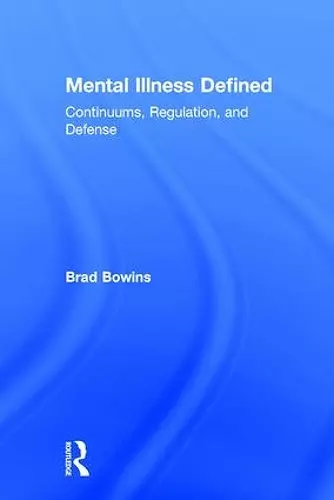Mental Illness Defined
Continuums, Regulation, and Defense
Format:Hardback
Publisher:Taylor & Francis Ltd
Published:9th Nov '16
Currently unavailable, and unfortunately no date known when it will be back
This hardback is available in another edition too:
- Paperback£44.99(9781138200609)

Understanding the true nature of mental illness is essential for interpreting disparate research results, establishing accurate diagnostic profiles, setting robust research agendas, and optimizing therapeutic interventions. Psychopathology currently lacks a unifying framework. Mental Illness Defined: Continuums, Regulation, and Defense provides such a framework by filling the knowledge gap. Continuums, as opposed to numerous discrete entities, characterize mental illness. Impaired regulation fosters extreme expressions of mental illness continuums, an occurrence that can be compensated for by "cognitive regulatory control therapies." Defenses tend to moderate behavior, although excessive levels foster dysfunction, as with personality disorders. The model presented aligns with neuroscience and other relevant data, thereby placing psychopathology on a more scientific foundation to advance the aims of both researchers and treatment providers.
A new approach to understanding mental disorders that contains the knowledge of psychoanalysis that has been ignored by cognitive theories. A way of looking at trauma and dissociation that will be helpful in treating all to common PTSD. Interesting ways of viewing autistic spectrum disorder. I really think this book will make a difference to clinicians who try to help their patients overcome the issues of modern day life.—Dr. Barbara Klein, private practice, Los Angeles, CA.
This book takes on a mighty and worthy task, the distinction in mental illness classification between the dimensional or continuum and the categorical. It is an old debate, now with renewed vigor since DSM-IV and DSM-5… Yet this book, in giving an example of the dimensional applied to psychiatric diagnosis stirs the discussion at just the right time. We need to have this discussion if we are ever to take the next step to a clinically sophisticated and relevant diagnostic system. In applying the continuum concept to illnesses we all know so well, he allows us the ability to think about the topic. . To whom will the book appeal? Anyone who works with patients. We all struggle to fit our diagnoses into the DSM Procrustean bed.—Professor Eric Marcus, Columbia University, Center for Psychoanalysis, Research.
“This book describes the dimensional applied to psychiatric diagnosis and stirs the discussion at just the right time. The DSM system of rigid categories for psychiatric diagnosis is increasingly called into validity question. Categorical vs dimensional; we need to have this discussion. Bowins allows us the ability to think about the topic in the sophisticated way it demands!”
Eric R. Marcus, MD, director, Columbia University Center for Psychoanalytic Training and Research, professor of clinical psychiatry, Columbia University College of Physicians and Surgeons
“Mental Illness Defined is a thought-provoking and meaningful book. Dr. Bowins presents a sophisticated and innovative approach to understanding and integrating contemporary psychoanalytic theory with the latest cognitive behavioral theory and neuroscience. This combination of theories is presented on a continuum and provides a coherent and cohesive way of looking at the practice and necessary research in mental health in today's world. This approach is positive, individualistic, and open-ended in a dogmatic and rigid atmosphere that prescribes discrete sophomoric categories for emotional deregulation.”
Barbara Klein, PhD, ED, author of Alone in the Mirror: Twins in Therapy
“As a scientific classification of psychiatric illness, the current DSM has evoked widespread dissatisfaction. Clearly, alternative schemes of illness classification are needed. Here Dr Bowins throws into the mix the concepts of continuum, regulation and defense: many disorders acting in reciprocal relationship to one another in order to maintain balance in the organism. The analysis is strikingly original, based on a command of the enormous literature, and is an essential contribution to the coming debate.”
Edward Shorter, PhD FRSC, Jason A Hannah Professor of the History of Medicine, professor of psychiatry, faculty of medicine, University of Toronto
ISBN: 9781138200593
Dimensions: unknown
Weight: 476g
244 pages